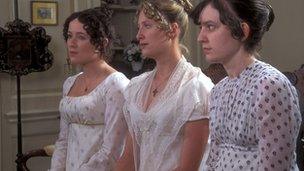Pride and Prejudice tops teachers' favourite 100 books
- Published
- comments

Pride and Prejudice was written 200 years ago, and adapted numerous times for TV and film
Jane Austen's Pride and Prejudice has topped a list of teachers' favourite books, external, compiled by the Times Educational Supplement (TES).
An online survey asked 500 teachers to name their favourite titles.
Harper Lee's To Kill a Mockingbird was second and the Harry Potter series third - but the top 100 also includes picture books like The Gruffalo.
The list "is a masterpiece of erudition and entertainment", according to TES editor Gerard Kelly.
"It could be one of the few things that Michaels Gove and Rosen agree on", he writes in a leader column for the magazine, reflecting an ongoing disagreement between the secretary of state and the former children's laureate over the direction of English teaching in England's schools.
Mr Kelly points out that apart from a modern intrusion in the form of Harry Potter, the top 10 is dominated by the literary canon in the shape of the Brontes, Orwell and Tolkien.
Literary merit
Thomas Hardy, Dickens and Tolstoy all figure in the list, alongside books for very young children like The Gruffalo by Julia Donaldson, and Eric Carle's early years counting book: The Very Hungry Caterpillar.
Bethan Marshall, a senior lecturer in English education at King's College London told the magazine the literary merit of picture books was often underestimated, comparing The Very Hungry Caterpillar favourably with another literary hit, Yann Martel's Life of Pi.
Dr Marshall said the central plot line where the caterpillar eventually becomes a butterfly is transformational and "worthy of Life of Pi, possibly even more meaningful than Life of Pi".
The list also includes books for older children like Roald Dahl's The Twits, plus titles beloved of teenagers such as Stephanie Meyer's Twilight series and The Hunger Games by Suzanne Collins.
There are also a number of English set texts: To Kill a Mockingbird is one, Steinbeck's Of Mice and Men is another.
Dr Marshall told the TES that this may reflect the broad nature of the teaching profession: "When you have any eclectic group, including one made up of teachers, there are going to be those who don't read that much.
"So they think back to books that they've read at one time, and possibly that might be a set text."
Mr Kelly added: "Strip out the children's books, the inclusion of which is only to be expected from people whose job it is to engage children, and what you are left with is a pretty canonical list.
There's enough Dickens, Steinbeck, Hardy, Wilde, Tolstoy, Dostoevsky, Hugo and Eliot to satisfy even the most conservative of politicians, and of course, plenty of modern greats: Kerouac, Ishiguro, Roy and Plath, to please the modernists.
"As a list, I think it's a pretty healthy reflection of a profession that really knows what makes a great book."
- Published25 January 2013
- Published31 March 2013
- Published7 February 2013
- Published8 January 2013
- Published9 November 2012
- Published22 May 2012
- Published2 February 2012